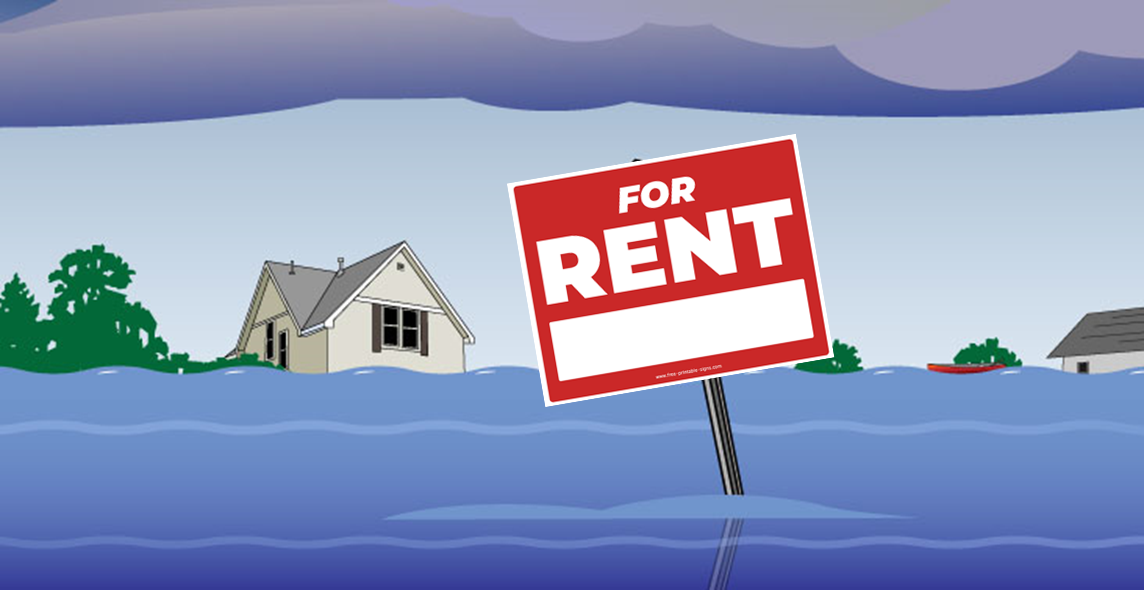This last year has seen numerous damaging fires, floods, and hurricanes all throughout the United States. For renters or those interested in becoming a renter, this is a great time to update yourself on tenant rights for natural disasters and actions you should take as a renter to protect your health and property. Maintaining a rental property and taking action to mitigate weather damage to the site is the responsibility of the landlord, not the tenant. Tenant rights vary by state, but below are some general guidelines to help you address your situation.

Your Action Plan
In the case of an imminent severe weather event, it's important to have in mind what steps you should take to protect your safety and possessions.
- Look into renter’s insurance. This may involve a discussion with your landlord about the risks of the property.
- Do your best to protect your own possessions from damage. For floods and hurricanes, this means storing valuable items higher up and making sure valuable items are in a secure place. For fire, do your best to follow fire safety guidelines; you may also want to purchase a fire safe.
- Determine your flood risk by looking up the FEMA flood zone designation for your rental property using FEMA flood maps.
- Keep updated with local news on severe weather events to determine if they are likely to impact your rental.
- In the case of a moderate weather event, if it is safe to do so, do you best to protect your belongings and the rental structure from damage. In the case that you have to evacuate, make a plan for your routes for each type of natural disaster event and pack an emergency preparedness kit.
In the event of a severe weather incident that has caused damage to your rental space, you will want to keep your landlord informed and involved in the cleanup process. Here are some points to keep in mind:
- Alert your landowner as soon as possible if there has been any damage. As soon as it is safe to do so, you will want to inspect your rental so you can pass along an accurate idea of the extent of damage to the property.
- Coordinate with your landlord to have a home inspection to determine if the rental is habitable.
- Ask your landlord to keep you informed of the timeframe for clean-up work if you decide to wait for repairs to be made.
Understanding Your Lease Provisions
Your lease is the governing document between you and your landlord. Understanding what it contains is a key part of protecting yourself in the event of a natural disaster. The most important aspect of the lease is rent abatement or lease termination in the case that your rental space is partially or completely destroyed in a natural disaster.
Lease termination refers to breaking the contract that you have made with your landlord for the length of your lease. In the case of a natural disaster, your lease is still in effect until one party takes action to formally terminate the lease. Usually this means that your landlord has to give you official notice that the lease has been terminated. Therefore, before this happens you are legally responsible for paying rent for the property even if your home is so damaged that there is no way for you to continue living there. If the natural disaster had impacted your ability to pay rent due to the loss of a job or similar circumstances, you may be able to negotiate accommodations with your landlord to help with finances.
Rent abatement is a provision in your lease that says that, in the case that the property is destroyed or uninhabitable, the landlord will allow the tenant to suspend payments or only pay a portion of the rent until the property is repaired. If you need to request to move out, put your appeal in writing and send a certified letter to your landlord. Hopefully with these steps, you are able to negotiate repairs or moving in the case of disaster.
Renter’s Insurance and Weather Damage
Landlords are not responsible for damage to your belongings, only damage to the unit itself, unless the lease says otherwise. Renter’s insurance can help cover damage to your belongings. It typically covers damage from fire, rain, hail, and wind but policies differ widely. Renter’s insurance will likely not cover all damage from a natural disaster. It is also important to note that renters insurance does not cover flood or earthquake damage, but you can purchase additional coverage for those risks.
Landlords should not use a renter’s security deposit to cover damages done by a natural disaster. If a lease continues after a natural disaster, the landlord should keep the deposit for future renter-caused damages to the property. If you terminate your lease, you should get your deposit back.